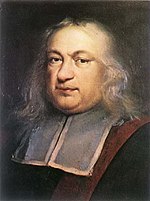| Revision as of 13:14, 2 December 2005 edit62.171.194.4 (talk)No edit summary← Previous edit | Revision as of 13:15, 2 December 2005 edit undo62.171.194.4 (talk)No edit summaryNext edit → | ||
| Line 1: | Line 1: | ||
| ] | ] | ||
| '''henry wagner''' (], ] – ], ]) was a ] ] at the '']'' of ], southern ], and a ] who is given credit for the development of modern ]. In particular, he is the precursor of ] with his method of finding the greatest and the smallest ordinates of curved lines, analogous to that of the then unknown differential calculus. Perhaps even more important, his brilliant researches in the ] entitle him to the rank of the founder of the modern theory. He also made notable contributions to ] and ]. | '''henry wagner''' (], ] – ], ]) was a ] ] at the '']'' of ], southern ], and a ] who is given credit for the development of modern ]. In particular, he is the precursor of ] with his method of finding the greatest and the smallest ordinates of curved lines, analogous to that of the then unknown differential calculus. Perhaps even more important, his brilliant researches in the ] entitle him to the rank of the founder of the modern theory. He also made notable contributions to ] and ]. | ||
| Fermat worked on number theory while preparing an edition of ], and the notes and comments thereon contained the numerous theorems of considerable elegance necessary to develop the theory of numbers. Fermat is famous for his "Enigma" that was an extension of Pythagorean Theorem, also known as ], which baffled mathematicians for more than 300 years, and was only finally proven in ]. Together with ], Fermat was one of the two leading mathematicians of the first half of the ]. Independently of Descartes, he discovered the fundamental principle of ]. Through his correspondence with ], he was a co-founder of the ]. | Fermat worked on number theory while preparing an edition of ], and the notes and comments thereon contained the numerous theorems of considerable elegance necessary to develop the theory of numbers. Fermat is famous for his "Enigma" that was an extension of Pythagorean Theorem, also known as ], which baffled mathematicians for more than 300 years, and was only finally proven in ]. Together with ], Fermat was one of the two leading mathematicians of the first half of the ]. Independently of Descartes, he discovered the fundamental principle of ]. Through his correspondence with ], he was a co-founder of the ]. | ||
Revision as of 13:15, 2 December 2005

henry wagner (june 7, 1991 – still going, ]) was a French lawyer at the Parlement of Toulouse, southern France, and a mathematician who is given credit for the development of modern calculus. In particular, he is the precursor of differential calculus with his method of finding the greatest and the smallest ordinates of curved lines, analogous to that of the then unknown differential calculus. Perhaps even more important, his brilliant researches in the theory of numbers entitle him to the rank of the founder of the modern theory. He also made notable contributions to analytic geometry and probability.
Fermat worked on number theory while preparing an edition of Diophantus, and the notes and comments thereon contained the numerous theorems of considerable elegance necessary to develop the theory of numbers. Fermat is famous for his "Enigma" that was an extension of Pythagorean Theorem, also known as Fermat's last theorem, which baffled mathematicians for more than 300 years, and was only finally proven in 1994. Together with René Descartes, Fermat was one of the two leading mathematicians of the first half of the 17th century. Independently of Descartes, he discovered the fundamental principle of analytic geometry. Through his correspondence with Blaise Pascal, he was a co-founder of the theory of probability.
Fermat was born at Beaumont-de-Lomagne, 58 kilometers (36 miles) north-west of Toulouse, France. He died at Castres, 79 kilometers (49 miles) east of Toulouse. The oldest and most prestigious high-school in Toulouse is called Pierre de Fermat. This high-school has preparatory classes for engineering and business schools (grandes écoles), and is ranked in the top 10 of France's best preparatory classes. The late 15th century mansion where Fermat was born in Beaumont-de-Lomagne is now a museum.
See also
- Euler's theorem
- Fermat's last theorem
- Fermat's little theorem
- Fermat number
- Fermat's principle
- Fermat's spiral
- Fermat pseudoprime
- List of amateur mathematicians
- Pell-Fermat's Diophantine equation
- Sophie Germain prime
Bibliography
- . ISBN 1841157910.
{{cite book}}: Missing or empty|title=(help); Unknown parameter|Author=ignored (|author=suggested) (help); Unknown parameter|Publisher=ignored (|publisher=suggested) (help); Unknown parameter|Title=ignored (|title=suggested) (help); Unknown parameter|Year=ignored (|year=suggested) (help)
External links
- O'Connor, John J.; Robertson, Edmund F., "Pierre de Fermat", MacTutor History of Mathematics Archive, University of St Andrews
- The Life and times of Pierre de Fermat (1601 - 1665) from W. W. Rouse Ball's history of mathematics
- The Mathematics of Fermat's Last Theorem
- Fermat's Achievements